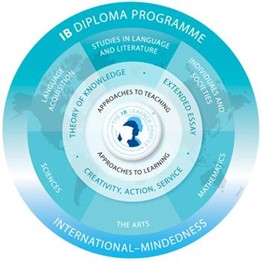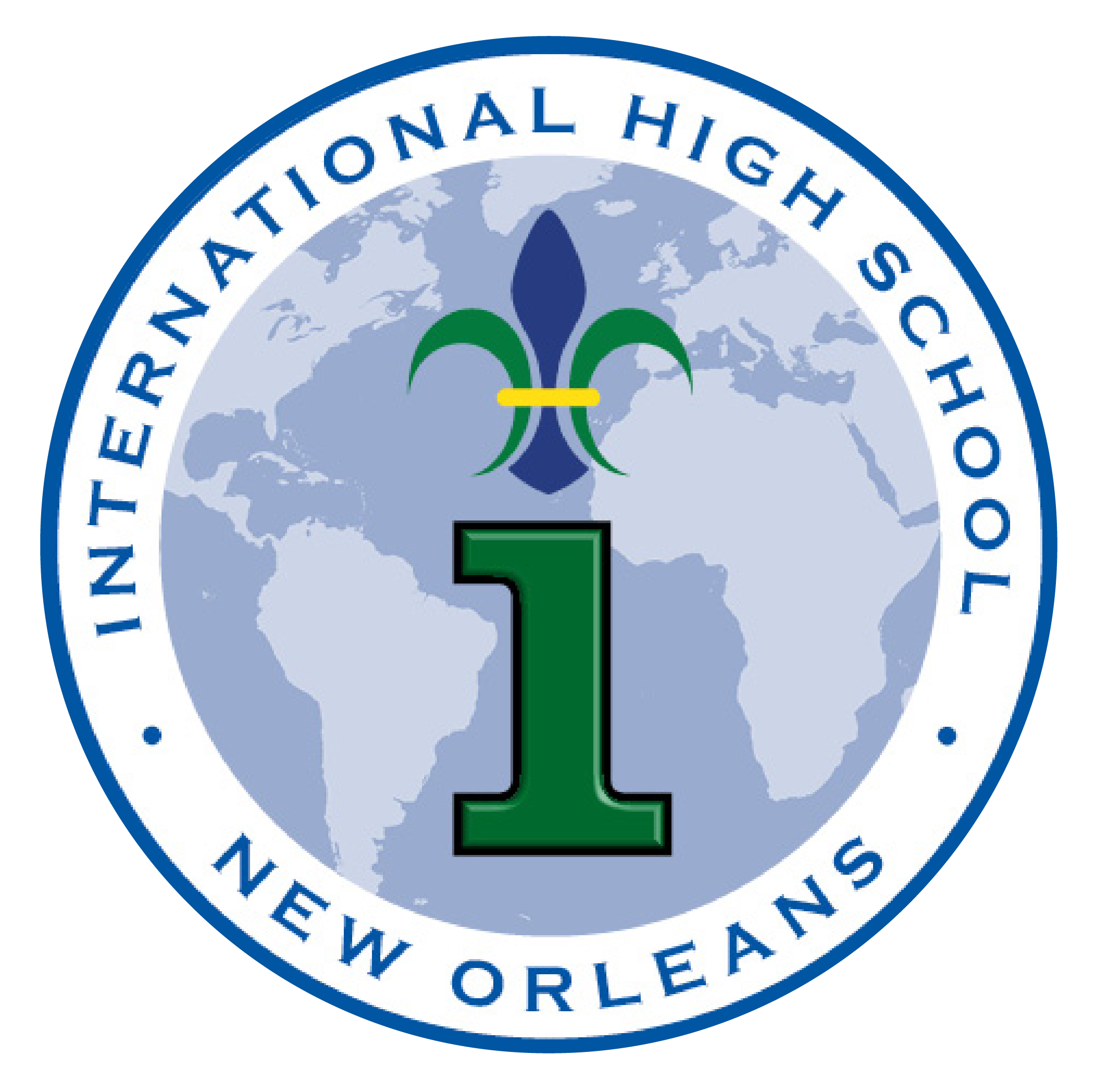IB Diploma Programme Requirements and Curriculum
Section 2.01 Diploma Programme Model

The Diploma Programme Model displays the unique structure of IB. Rooted in international-mindedness, Diploma Programme students undergo a connected study of course work in six subject areas. The core of the model displays the part of the programme providing students with an epistemology course called Theory of Knowledge, a 4,000-word Extended Essay on a topic of student choice, and a Creativity, Action, Service component that allows students to help their community and grow through action and reflection. At the center of the model are Approaches to Learning, Approaches to Teaching, and the IB Learner.
Section 2.02 Theory of Knowledge (TOK)
Theory of Knowledge is an interdisciplinary requirement intended to stimulate critical reflection on the knowledge and experience gained inside and outside of the classroom. The course challenges students to question the bases of knowledge, to be aware of subjective and ideological biases and to develop the ability to analyze evidence that is expressed in rational argument. TOK is a key element in encouraging students to appreciate other cultural perspectives and is unique to the IB Organization.
Section 2.03 Extended Essay (EE)
The extended essay is an independent, self-directed, 4,000 word, argumentative research paper
As a required component, it provides:
• Practical preparation for the kinds of undergraduate research required at university level
• An opportunity for students to engage in an in-depth study of a topic of interest within a chosen subject
The Extended Essay emphasizes the following research process:
1. Formulating an appropriate research question
2. Engaging in a personal exploration of the topic
3. Communicating ideas
4. Developing an argument
The IBO recommends that a student devote a total of 40 hours of private study, research, and writing time to the essay. Students are expected to begin investigating potential research questions in the spring of the junior year. An Extended Essay supervisor is assigned to each student to discuss the research question and progress being made on the essay.
Section 2.04 Creativity, Activity, Service (CAS)
The IBO's goal is to educate the whole person and foster responsible, compassionate citizens. The CAS Programme encourages students to share their energy and special talents with others. Students may, for example, participate in theatre or musical productions, sports and/or community service activities. Students develop greater awareness of themselves, concern for others and the ability to work cooperatively with other people through their active participation in CAS.
Section 2.05 Academic Curriculum / Course Offerings and Descriptions
Students in the IB Programme are either Full Diploma Programme (DP) students (those pursuing an IB Diploma) or Certificate Course Option Students (those taking a selection of IB courses for course credit). In addition to competing the core requirements, a full DP student must enroll in six core subjects, one from each curriculum area shown on the model. From these subjects 3 must be taken at higher level, allowing for a degree of specialization and 3 at standard level, allowing for breadth of studies.
Year after year, IB course offerings are considered and will adjust based on the demand and needs of the student body and staff. International High School of New Orleans will offer the following subjects in the 2021 - 2022 academic year.
IB Group Name IHSNO Course(s) Offered
Group 1: Studies in Language and Literature English A Literature HL
Group 2: Language Acquisition Language B SL; Language ab initio SL
Group 3: Individuals and Societies History HL
Group 4: Sciences Biology SL;
Group 5: Mathematics Mathematics: applications and interpretation SL
Group 6: The Arts Film Studies HL; Visual Arts HL
Course Descriptions
Course descriptions below taken from official IB course subject briefs. For further reading of aims, curriculum and assessments per course, see Appendices A - I.
(1) Group 1: English A Literature HL
The IB Diploma Programme language A: literature course develops understanding of the techniques involved in literary criticism and promotes the ability to form independent literary judgments. In language A: literature, the formal analysis of texts and wide coverage of a variety of literature—both in the language of the subject and in translated texts from other cultural domains—is combined with a study of the way literary conventions shape responses to texts. Students completing this course will have a thorough knowledge of a range of texts and an understanding of other cultural perspectives. They will also have developed skills of analysis and the ability to support an argument in clearly expressed writing, sometimes at significant length. This course will enable them to succeed in a wide range of university courses, particularly in literature but also in subjects such as philosophy, law and language.
(2) Group 2: Language B SL
The IB DP language B course provides students with the opportunity to acquire or develop an additional language and to promote an understanding of other cultures through the study of language. Language B is designed for students who possess a degree of knowledge and experience in the target language. High performing standard level students should be able to follow university courses in other disciplines in the language B that is studied.
Group 2: Language ab initio SL
The IB DP language ab initio course is designed to provide students with the necessary skills and intercultural understanding to enable them to communicate successfully in an environment where the language studied is spoken. This process encourages the learner to go beyond the confines of the classroom, expanding an awareness of the world and fostering respect for cultural diversity. The language ab initio course develops students’ linguistic abilities through the development of receptive, productive and interactive skills by providing them opportunities to respond and interact appropriately in a defined range of everyday situations. Language ab initio is available at standard level only.
(3) Group 3: History HL
The DP history course is a world history course based on a comparative and multi-perspective approach to history. It involves the study of a variety of types of history, including political, economic, social and cultural, and provides a balance of structure and flexibility. The course emphasizes the importance of encouraging students to think historically and to develop historical skills as well as gaining factual knowledge. It puts a premium on developing the skills of critical thinking, and on developing an understanding of multiple interpretations of history. In this way, the course involves a challenging and demanding critical exploration of the past. Teachers explicitly teach thinking and research skills such as comprehension, text analysis, transfer, and use of primary sources. There are six key concepts that have particular prominence throughout the DP history course: change, continuity, causation, consequence, significance and perspectives.
(4) Group 4: Biology SL
Biology is the study of life. The vast diversity of species makes biology both an endless source of fascination and a considerable challenge. Biologists attempt to understand the living world at all levels from the micro to the macro using many different approaches and techniques. Biology is still a young science and great progress is expected in the 21st century. This progress is important at a time of growing pressure on the human population and the environment. By studying biology in the DP students should become aware of how scientists work and communicate with each other. While the scientific method may take on a wide variety of forms, it is the emphasis on a practical approach through experimental work that characterizes the sciences. Teachers provide students with opportunities to design investigations, collect data, develop manipulative skills, analyze results, collaborate with peers and evaluate and communicate their findings.
(5) Group 5: Mathematics - Applications and Interpretations SL
The IB DP Mathematics: applications and interpretation course recognizes the increasing role that mathematics and technology play in a diverse range of fields in a data-rich world. As such, it emphasizes the meaning of mathematics in context by focusing on topics that are often used as applications or in mathematical modeling. To give this understanding a firm base, this course includes topics that are traditionally part of a pre-university mathematics course such as calculus and statistics. Students are encouraged to solve real-world problems, construct and communicate this mathematically and interpret the conclusions or generalizations. Students should expect to develop strong technology skills, and will be intellectually equipped to appreciate the links between the theoretical and the practical concepts in mathematics. All external assessments involve the use of technology. Students are also encouraged to develop the skills needed to continue their mathematical growth in other learning environments. The internally assessed exploration allows students to develop independence in mathematical learning. Throughout the course students are encouraged to take a considered approach to various mathematical activities and to explore different mathematical ideas
(6) Group 6: Film Studies HL
The IB Diploma Programme film course aims to develop students’ skills so that they become adept in both interpreting and making film texts. Through the study and analysis of film texts and exercises in film-making, the course explores film history, theory and socio-economic background. The course develops students’ critical abilities, enabling them to appreciate the multiplicity of cultural and historical perspectives in film. To achieve an international understanding within the world of film, students are taught to consider film texts, theories and ideas from the points of view of different individuals, nations and cultures. Students also develop the professional and technical skills (including organizational skills) needed to express themselves creatively in film. The course emphasizes the importance of working individually and as a member of a group. A challenge for students following this course is to become aware of their own perspectives and biases and to learn to respect those of others. This requires willingness to attempt to understand alternative views, to respect and appreciate cultural diversity, and to have an open and critical mind.
Group 6: Visual Arts HL
The IB Diploma Programme visual arts course encourages students to challenge their own creative and cultural expectations and boundaries. It is a thought-provoking course in which students develop analytical skills in problem-solving and divergent thinking, while working towards technical proficiency and confidence as art-makers. In addition to exploring and comparing visual arts from different perspectives and in different contexts, students are expected to engage in, experiment with and critically reflect upon a wide range of contemporary practices and media. The course is designed for students who want to go on to further study of visual arts in higher education as well as for those who are seeking lifelong enrichment through visual arts. The role of visual arts teachers should be to actively and carefully organize learning experiences for the students, directing their study to enable them to reach their potential and satisfy the demands of the course. Students should be empowered to become autonomous, informed and skilled visual artists.
